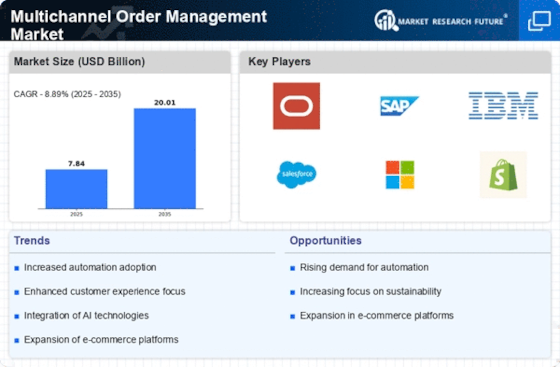Top Industry Leaders in the Multichannel Order Management Market
Competitive Landscape of the Multichannel Order Management Market:
The multichannel order management (MOM) market is experiencing a surge, fueled by the booming e-commerce sector and the rising demand for seamless omnichannel shopping experiences. With businesses juggling orders across online stores, physical shops, and mobile apps, the need for efficient order orchestration has become paramount. This dynamic landscape is marked by established players, emerging challengers, and a range of strategies vying for market share.
Key Players:
- IBM
- Oracle
- SAP
- Salesforce
- HCL Technologies
- Zoho
- Brightpearl
- Stitch Labs
- Selro
- Linnworks
- Vinculum
- Freestyle Solutions
- Aptean
- Etail Solutions
- SellerActive
Strategies Shaping the Market:
- Product Innovation: Continuous improvement of core functionalities like inventory management, order fulfillment, and returns processing remains a key differentiator. Integration with AI, machine learning, and automation tools is adding intelligence and boosting operational efficiency.
- Partnerships and Acquisitions: Building ecosystems through strategic partnerships with e-commerce platforms, logistics providers, and payment gateways is a major growth strategy. Acquisitions bolster technology portfolio and expand market reach.
- Subscription and Cloud-Based Models: The shift towards subscription-based and cloud-deployed OMS solutions is making them more accessible and scalable, particularly for smaller businesses.
Factors Driving Market Share Analysis:
- Target Market Focus: Understanding the specific needs of different business sizes and industries is crucial. Some vendors excel in B2C e-commerce, while others cater to complex B2B operations.
- Functionality and Pricing: The breadth and depth of features offered, coupled with competitive pricing, play a significant role in attracting customers. Balancing functionality with user-friendliness is key.
- Implementation and Support: Seamless integration with existing systems, efficient onboarding processes, and robust customer support are critical for successful OMS adoption.
New and Emerging Companies:
Several startups are making their mark with innovative approaches:
- Cloud-native, microservices-based platforms: Companies like Fabric and Ware2Go offer highly scalable and adaptable solutions, catering to the need for agility and customization.
- Vertical-specific offerings: OMS solutions tailored to specific industries like grocery or fashion are emerging, addressing unique operational challenges.
- Headless commerce solutions: Open-source and API-driven OMS platforms enable seamless integration with any frontend platform, empowering businesses to build custom storefronts.
Current Investment Trends:
Venture capital firms are actively investing in promising OMS startups, recognizing the market's growth potential. Key areas of interest include:
- Artificial intelligence and machine learning: Utilizing AI for inventory forecasting, dynamic pricing, and personalized recommendations.
- Robotic process automation: Automating repetitive tasks to improve efficiency and reduce errors.
- Blockchain technology: Enhancing supply chain transparency and traceability.
Latest Company Updates:
Nov 15, 2023: Oracle released a new version of its Order Management Cloud with improved functionalities for B2B operations. The update includes advanced quoting and order configuration tools, streamlined drop shipping capabilities, and tighter integration with enterprise resource planning (ERP) systems.
Oct 26, 2023: NetSuite announced a partnership with ShipStation to offer integrated fulfillment solutions for its OMS customers. The integration allows businesses to manage shipping rates, multi-carrier selection, and real-time tracking directly within the NetSuite platform.
- Beta
Beta feature
Beta feature










